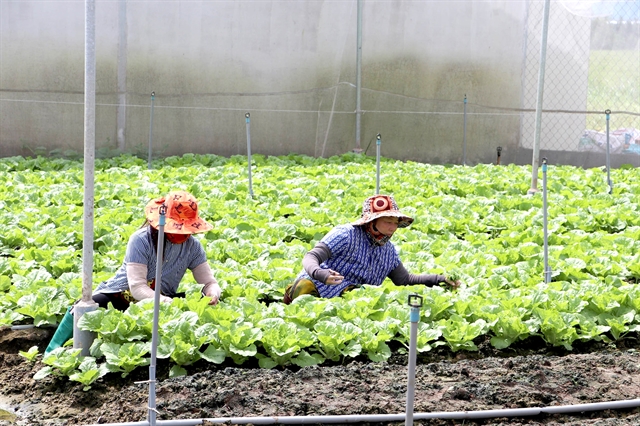 Society
Society

More and more rice farmers in Tiền Giang Province’s coastal areas are turning to other short-term crops to adapt to climate change and increase farming efficiency.

|
| Farmers harvest vegetables grown in a net house in Long Thuận Commune in Tiền Giang Province’s Gò Công Town. – VNA/VNS Photo Minh Trí |
TIỀN GIANG – More and more rice farmers in Tiền Giang Province’s coastal areas are turning to other short-term crops to adapt to climate change and increase farming efficiency.
In the coastal districts of Gò Công Đông and Tân Phú Đông, they have planted vegetables on more than 13,500ha of what used to be paddies this year.
They have harvested nearly 221,000 tonnes of vegetables, 40,000 tonnes more than in the same period last year.
Their incomes have risen by 2.2-13.3 times to VNĐ47.4-290 million (US$2,000-12,000) per hectare per crop, according to the province Department of Agriculture and Rural Development.
Nguyễn Văn Quí, head of the Gò Công Đông District Bureau of Agriculture and Rural Development, said to mitigate the impact of natural disasters and develop agriculture, rice farmers in coastal communes are rotating between rice and other short-term crops or completely switching to the latter.
Tân Điền red onions and Đèn Đỏ watermelon have become the district’s well-known products because of their high quality and resultant demand.
In Tân Phú Đông District, authorities are encouraging rice farmers who grow one crop a year in saltwater affected areas to switch to lemon grass, which is ideal for local conditions and fetches high prices.
The province’s largest lemon grass producing district has established a 3,400ha concentrated growing area.
Farmers in the area grow more than 1,400ha of the grass and have harvested 23,000ha so far this year.
The district plans to have 3,700ha under the grass and an output of more than 60,000 tonnes this year.
Bùi Thái Sơn, secretary of the district Party Committee and chairman of its People’s Committee, said the restructuring of agriculture due to climate change is one of the district’s major tasks.
To improve the value of vegetables and other short-term crops, the province has developed co-operatives and co-operative groups and mechanised tilling, spraying of chemicals and irrigation.
These co-operatives and co-operative groups use advanced farming techniques, adopt Vietnamese good agricultural practices, and have contracts with companies and collective kitchens to secure outlets.
Bình Nghị and Tân Đông, two safe vegetable co-operatives in Gò Công Đông District, have, for instance, contracts to sell their produce to supermarkets, clean vegetable shops and collective kitchens.
Võ Công Thành, director of Bình Nghị, said his co-operative sells three to five tonnes of vegetables a day.
It gets an average yield of 25 tonnes per hectare per crop to earn VNĐ100 million ($4,100), many times higher than from rice, he said.
Tân Phú Đông District has established one co-operative and co-operative group each to grow lemon grass, and guarantees outlets for their members. – VNS